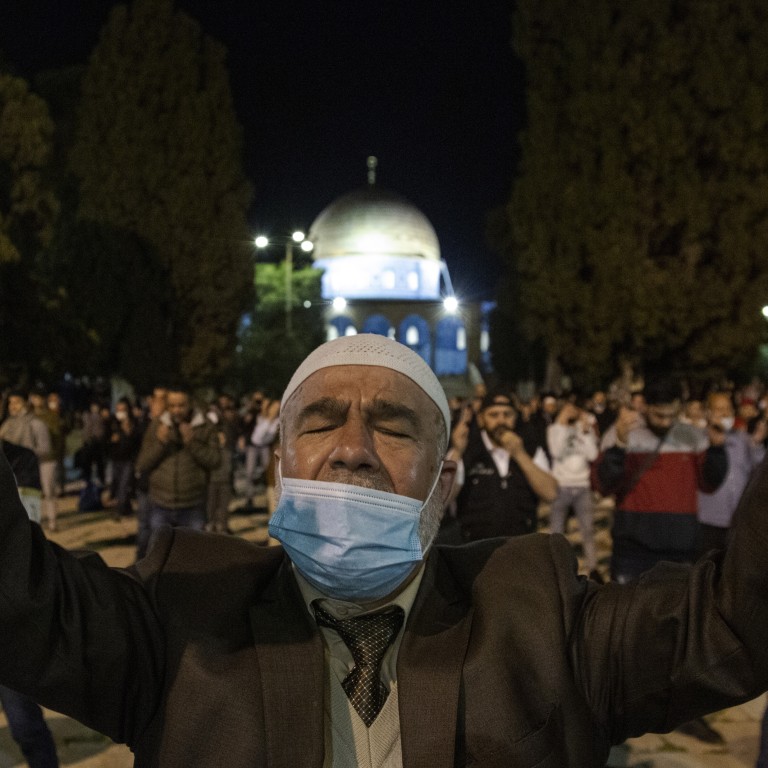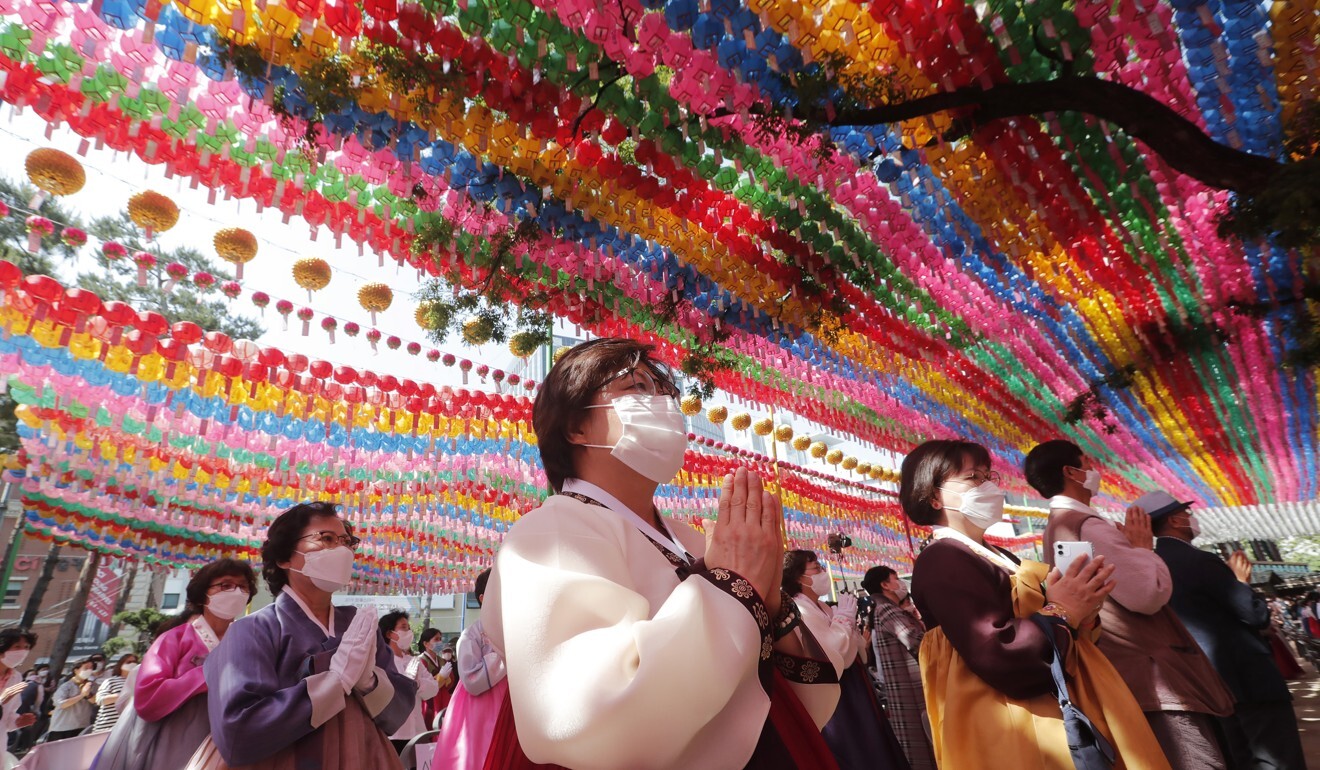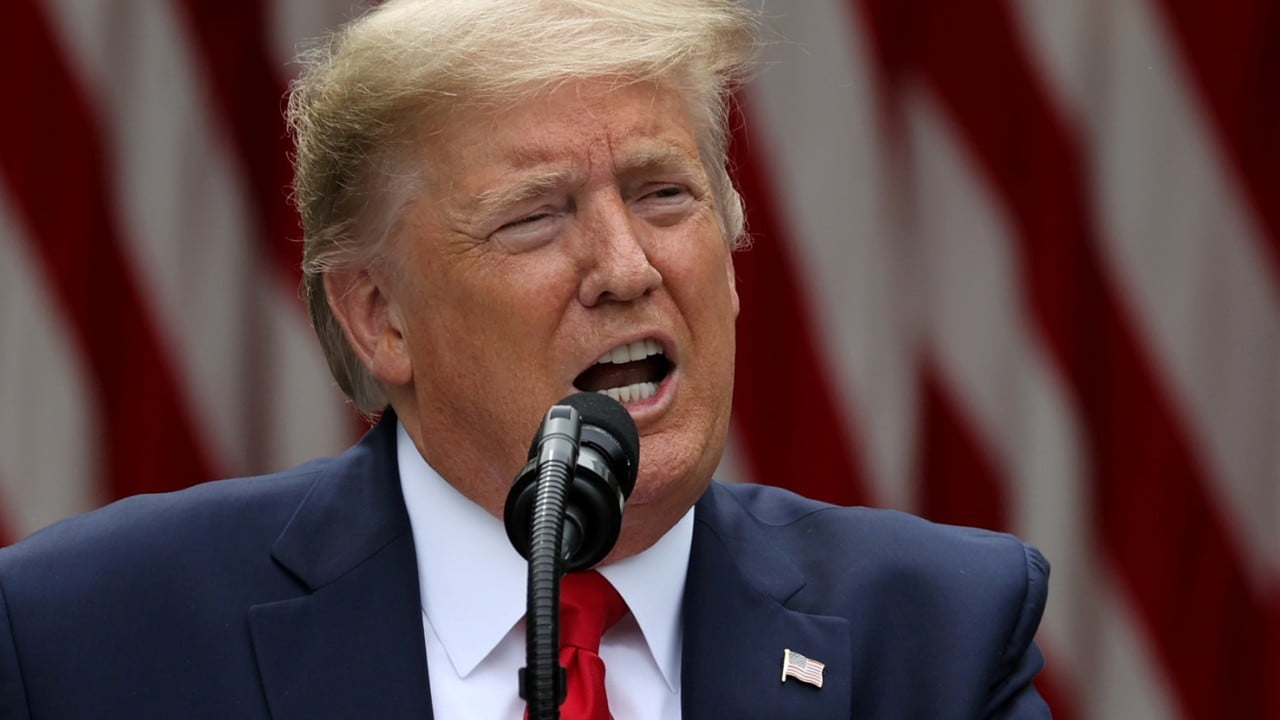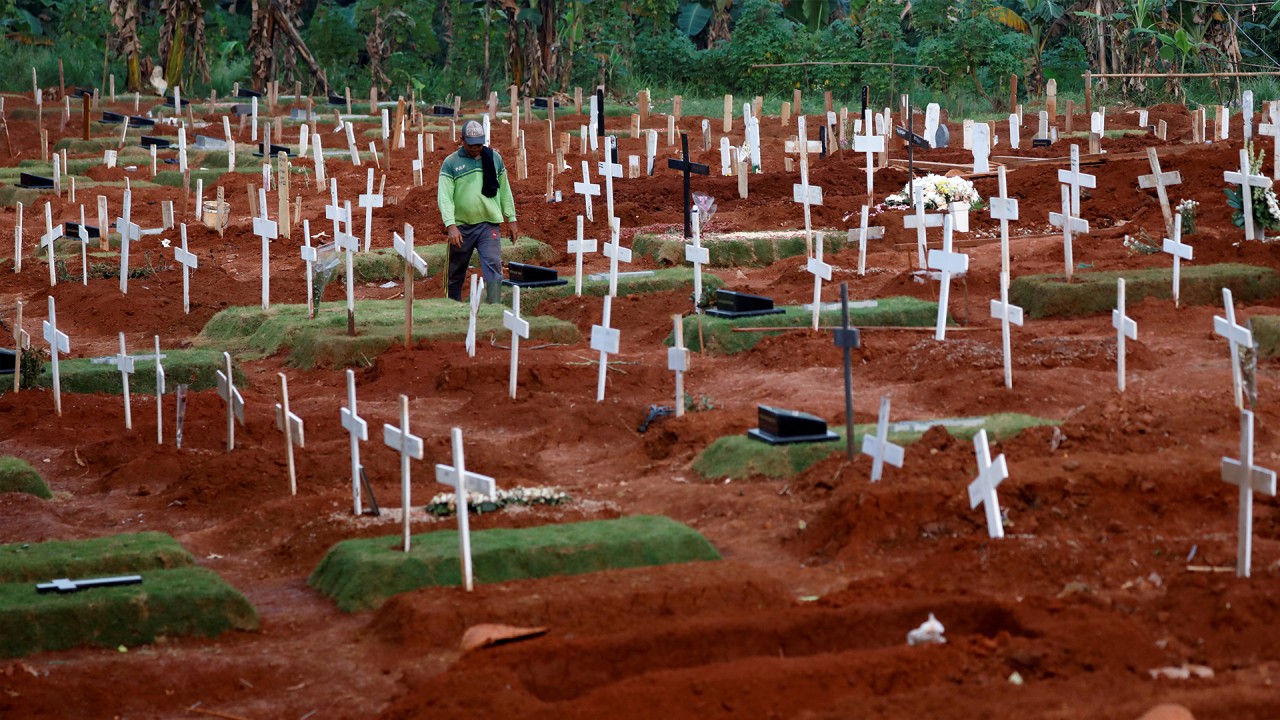
Coronavirus latest: global cases top 6 million; mosques reopen in Saudi Arabia and Jerusalem; Brazil passes France in deaths; backlash against Trump exiting WHO
- Trump faced a broad backlash over severing ties with the WHO; Japan mulls easing entry limits for four countries, report says
- Brazil has the world’s fourth-highest death toll; India to start lifting lockdown in phases from Monday
The number of coronavirus cases worldwide topped six million Sunday, with Brazil registering another record surge in daily infections as divisions deepened on how to deal with the pandemic.
Latin American countries are bracing for difficult weeks ahead as the disease spreads rapidly across the region, even as much of the world exits lockdowns that have wrecked economies and stripped millions of their jobs.
In Brazil – the epicentre of South America’s outbreak with nearly 500,000 confirmed cases, lagging only behind the United States – disagreement among leaders over lockdown measures has hampered efforts to slow the virus as the number of fatalities in the country nears 30,000.
President Jair Bolsonaro, who fears the economic fallout from stay-at-home measures will be worse than the virus, has berated governors and mayors for imposing what he calls “the tyranny of total quarantine”.
As the global death toll from the pandemic surpassed 368,000, US President Donald Trump’s decision to permanently cut funding to the World Health Organisation has been broadly criticised.
The first 41 cases of coronavirus were confirmed in Wuhan, China, on January 10 and it took the world until April 1 to reach its first million cases. Since then, about 1 million new cases are reported every two weeks.
Despite the continued increase in cases, many countries are opening schools and workplaces following weeks of unprecedented lockdowns that have stemmed the spread of the disease – but also hammered economies and thrown millions out of work.
These are the developments:
Mosques reopen in Saudi Arabia and Jerusalem
Tens of thousands of mosques across Saudi Arabia reopened Sunday for the first time in more than two months, but worshippers have been ordered to follow strict guidelines to prevent the spread of the coronavirus as Islam’s holiest site in Mecca remained closed to the public.
The Al-Aqsa Mosque in Jerusalem, the third holiest site for Muslims after Saudi Arabia’s Mecca and Medina, also reopened for prayers for the first time since it was closed since mid-March. Throngs waited outside the holy site’s gates before it opened early Sunday, with many wearing surgical masks. As they were allowed to enter, the faithful stopped to have their temperature measured.
The mosque was one of Jerusalem’s many holy sites, including the Church of the Holy Sepulcher and the Western Wall, that were restricted to worshippers at the height of Israel’s coronavirus outbreak.

Throughout that period, worshippers continued to pray in the alleyways outside the mosque.
In Saudi Arabia, the government prepared for the reopening of around 90,000 mosques after sanitising prayer rugs, washrooms and shelves holding copies of the Koran, the Muslim holy book.
The Grand Mosque in Mecca, which houses the cube-shaped Kaaba that Muslims around the world pray toward, will remain closed to the public. The mosque in Medina where the Prophet Muhammad is buried will be partially opened to the public to pray outside. Despite taking early and unprecedented measures to curb the spread of the virus, Saudi Arabia has recorded more than 83,000 people contracting the virus, including 480 deaths.
Bangladesh lifts virus lockdown on day with record deaths
Bangladesh lifted its coronavirus lockdown on Sunday, with millions heading back to work in densely populated cities and towns even as the country logged a record spike in deaths and new infections.
“The lockdown has been lifted and we are heading almost towards our regular life,” health department spokeswoman Nasima Sultana said, calling on those returning to work to wear masks and observe social distancing.
The lifting comes as Bangladesh – which on Friday took an emergency pandemic loan from the International Monetary Fund – reported its biggest daily jump in infections on Sunday, with 2,545 new cases and a record 40 deaths.
In the crowded capital Dhaka, passengers piled into trains and traffic clogged up the streets as workers returned to their jobs after months of restrictions that have battered the economy.
Some wore gloves and masks as they headed to their offices, while others stood the recommended half metre apart as long queues formed outside bank branches.
Philippines says almost 100,000 citizens stranded overseas by pandemic
The number of Filipino workers stranded across the world has swollen to almost 100,000 after commercial flights were halted because of the pandemic, according to the Labour Department.
About 85 per cent of the 98,615 citizens stuck overseas are in the Middle East, while the remainder are in Europe, the US and other Asian countries, according to a statement posted on the website of the department of labour and employment. About one-fifth of the workers have unfinished contracts, or are distressed and needing repatriation in the coming weeks, the department said.
The Philippines has spent more than 700 million pesos (US$13.8 million) repatriating, accommodating and feeding more than 30,000 citizens since the start of the global pandemic, according to the department.
South Korea reports 27 new cases
South Korea has reported 27 new cases of the coronavirus, including 21 from the densely populated Seoul metropolitan area, where officials have been scrambling to stem transmissions linked to club-goers and warehouse workers.
The figures announced by South Korea’s Centres for Disease Control and Prevention on Sunday brought national totals to 11,468 cases and 270 deaths. Twelve of the new cases were linked to international arrivals.
South Korea was reporting about 500 new cases per day in early March but had seemed to stabilise its outbreak with aggressive tracking and tracing, which allowed authorities to ease social distancing guidelines.

But cases in the greater capital area have been rising steadily again since May amid increased public activity, causing alarm as millions of children have begun returning to schools.
On Saturday, KCDC senior official Kwon Jun-wook said at least 108 infections were linked to workers or visitors at a warehouse of local e-commerce giant Coupang, which has seen orders spike amid the epidemic.
Around 270 other infections have been linked to nightclubs and other entertainment venues, which saw huge crowds in early May amid the relaxed atmosphere on social distancing.
China reports two new cases
China recorded two new confirmed cases of coronavirus on May 30, down from four the day before, data from the country’s health authority showed on Sunday.
Both cases were imported in the Chinese province of Shandong, the National Health Commission (NHC) said in a statement on its website.
The NHC also confirmed three new asymptomatic cases, compared to four the day before.
With no new deaths reported, the death toll remained at 4,634.
The total number of confirmed cases in the mainland as of May 30 stood at 83,001, data form NHC showed.
Trump faces backlash over WHO exit
US President Donald Trump faced a broad backlash over severing ties with the UN’s health agency during a pandemic, as the coronavirus surged in Latin America while Europe further reopened from lockdown.
The EU called on Washington to reconsider its decision to permanently cut funding to the World Health Organisation over its handling of the pandemic,
“Now is the time for enhanced cooperation and common solutions,” the European Union said in a statement, adding: “Actions that weaken international results must be avoided.”
Trump initially suspended funding to the WHO last month, accusing it of not doing enough to curb the early spread of the virus and being too lenient with China, where Covid-19 emerged late last year.
On Friday he made that decision permanent in a major blow for the agency’s finances, as the US is by far its biggest contributor, supplying US$400 million last year.
Germany’s Health Minister Jens Spahn said the “disappointing” decision was a setback for global health, while Chancellor Angela Merkel declined to attend an in-person G7 summit that Trump had suggested he would host.
Richard Horton, editor of The Lancet medical journal, said it was “madness and terrifying both at the same time”.
“The US government has gone rogue at a time of humanitarian emergency.”

00:51
Donald Trump says the US is ‘terminating its relationship with the World Health Organisation’
India to start lifting lockdown in phases from Monday
The Indian government said it will reopen economic activities in a phased manner from Monday with the number of coronavirus infections in the country topping 180,000.
The guidelines announced by the interior ministry on Saturday indicated that designated Covid-19 containment zones, including accompanying lockdowns, will remain in place until June 30.
Religious sites and places of worship, hotels, restaurants and other hospitality services and shopping malls will be allowed to reopen outside containment zones from June 8.
Schools, colleges and other educational institutions will remain closed nationwide and only be allowed to reopen after a further assessment of the situation in July.
The ministry also said that some business activity, including international flights, metro rail transport and theatres, will continue to be prohibited for some time.
India put in place nationwide lockdown restrictions on March 25. Since late April, the government has gradually eased some of its antivirus measures.
It reported more than 8,000 new cases in a single day on Sunday, another record high that topped the deadliest week in the country. Confirmed infections have risen to 182,143, with 5,164 fatalities, including 193 in the last 24 hours, the Health Ministry.
Belgian prince tests positive after gathering in Spain
A nephew of Belgium’s King Philippe, Prince Joachim, has tested positive for coronavirus after attending a party in Spain, which Spanish media said broke lockdown rules because of the number of people there.
The prince, 28, tested positive after attending the gathering in the southern city of Cordoba on May 26, a spokesperson for the Belgian Royal Palace said on Saturday.
The spokesperson said the palace could not confirm the number of people in attendance at the party. The palace said Joachim travelled to Spain from Belgium on May 24 for an internship and was still there.
El Pais newspaper said the prince, who is tenth in line to the Belgian throne, attended the party along with 26 other people.
This would be a breach of lockdown rules in the province of Cordoba, where the maximum number of people permitted to meet is currently 15.
Spanish police said they had launched an investigation into the incident and those who breached restrictions could face a fines of up to €10,000 (US$11,100).
All 27 people who attended the party are now in quarantine, Rafaela Valenzuela, the Spanish government’s regional envoy in Cordoba, said.
Valenzuela called the gathering “completely irresponsible” and said it could have caused an outbreak of infections, triggering a return to a stricter lockdown.
Spain’s Prime Minister Pedro Sanchez said on Sunday he will seek parliament’s approval to extend the state of emergency one final time, which would keep the coronavirus lockdown in place until June 21.
UN to use Liberian president’s Covid-19 awareness song
Liberian President George Weah, a former international football legend, has released a song to be used by the UN to spread awareness about the new coronavirus.
Weah hopes to appeal to music lovers across the West African nation of some 4.5 million people to ensure Covid-19 does not spread further.
It is not the first time Weah has used his singing skills. During the 2014 Ebola crisis, when he was a senator, he released an awareness song.
“The song, Let’s Stand Together to Fight Corona, will be a part of the second phase of Unesco’s #DontGoViral campaign, which they say is aimed at informing and sensitising communities across Africa about the dangers of the disease,” Weah’s office said.
“The organisers say the music will be subtitled in French and Arabic, and is expected to be featured on various platforms during the campaign – including the BBC and France 24.
“The Liberian leader was also asked to be the public ambassador of the campaign in order to mobilise innovators and artists across Africa,” it said.
The song’s lyrics list several dos and dont’s – including washing hands regularly – to keep the virus at bay. Weah’s office said he penned it himself.
Liberia has 280 declared cases so far and 27 Covid-19 deaths.
China building secure facilities to fast track coronavirus vaccine production
Brazil surpasses France in deaths
Brazil reported a record 33,274 new cases of the novel coronavirus on Saturday, its health ministry said, and the death toll surpassed that of France and now ranks only below the United States, Britain and Italy.
The South American nation has now reported 498,440 confirmed cases of coronavirus since the outbreak began, a level of contagion second only to the United States.
The death toll in Brazil from Covid-19, the respiratory illness caused by the coronavirus, increased to 28,834, with 956 new deaths in the last 24 hours, the ministry said.
Brazilian states are preparing to ease quarantine restrictions despite warnings from public health experts who say the worst is still to come.
Brazil’s right-wing President Jair Bolsonaro has played down the gravity of the epidemic and criticised lockdowns for paralysing the economy and causing widespread unemployment and hardship.
Russia plans vaccine clinical trials in two weeks
Russian scientists plan to start clinical trials within two weeks on a vaccine to combat the novel coronavirus, the country’s health minister was quoted as saying.
Russia has the world’s third-highest toll of coronavirus infections after the United States and Brazil, and Kremlin officials have said the nation’s researchers are working on almost 50 different vaccine projects.
“The tests are under way and we plan to start clinical trials in the next two weeks,” Health Minister Mikhail Murashko was quoted as saying by the TASS news agency. He said volunteers had been selected to take part in the trials.
Drug makers worldwide are rushing to develop treatments and vaccines for the virus.
There are currently about 10 coronavirus vaccines being tested in humans and experts have predicted that a safe and effective vaccine could take 12 to 18 months from the start of development.
One of the Russian vaccine projects is being undertaken by the state-run Vektor Institute in Siberia, and the institute’s director general, Rinat Maksyutov, said on Saturday he hoped to complete clinical trials in mid-September.
Maksyutov said vaccine trials on animals had been successful.

01:26
Indonesia coronavirus death toll may be higher than reported, burial numbers indicate
Italy prepares to relax travel restrictions
Italy added 111 new victims to the country’s official death toll from the new coronavirus and 416 new infections as it prepares to relax travel restrictions this week.
The increases bring the official death toll to 33,340 and are in line with recent daily tallies, suggesting the contagion is under control nearly four weeks after the country began gingerly loosening a strict lockdown in what has been the epicentre of the European pandemic.
On Friday, the Health Ministry said the crucial weeklong, region-by-region monitoring had shown no critical problems, giving the go-ahead for relaxation on travel starting Wednesday.
Greece to allow tourists from all nations
Greece will allow visitors from more nations to visit the country from June 15 with rules varying according to the airport of origin. International flights will be allowed to Athens and Thessaloniki in a bridge phase from June 15 to June 30 from countries on a list compiled by the European Union Aviation Safety Agency, including the UK and the US, the country’s Foreign Ministry said. From July 1, the measure is expanded to all Greek airports.
Greece’s Tourism Ministry had originally said on Friday that only visitors from 29 countries including China would be allowed to enter the country from June 15 with further nations to be gradually added to the list from July 1. The Greek government clarified on Saturday that it will also allow tourists from the other countries to enter the country in the bridge phase with different rules depending on the airport of origin as shown in the EASA list. If travel originates from an airport not in the EASA affected area list then visitors are only subject to random tests upon arrival. If the journey originates from an airport on the EASA affected area list, the visitors will be tested upon arrival; if negative, the passenger self-quarantines for seven days and if positive, the passenger is quarantined under supervision for 14 days.
As Europe reopens borders, foreign minister says don’t treat Italy like a leper colony
Parisians flock to parks
Parisians flocked to parks and gardens as they reopened in the sunny French capital on Saturday for the first time after almost 11 weeks of coronavirus lockdown, one of the last areas of France to ease restrictions.
With public impatience mounting and temperatures up to 28 degrees Celsius (82 Fahrenheit) forecast over the holiday weekend, authorities brought forward the parks’ reopening, initially scheduled for June 2.
“At last we’re free,” said Anne, a Parisienne standing near the gates of the 400-year-old Luxembourg Gardens on the city’s Left Bank soon after they reopened. “This feels like being released from a kind of prison.”
Paris Mayor Anne Hidalgo has pressured the government to reopen parks since the national lockdown was eased on May 11. Hidalgo is standing for re-election next month.

Early risers beat the crowds, some bearing breakfast picnics as they waited for the gates of the northeastern Buttes-Chaumont to swing open at 7am, according to TV reports.
Social distancing rules remain in force across Paris and the recommended wearing of masks in parks may soon become compulsory as health officials remain watchful for any new increase in infections.
Restaurants, cafes and bars in the French capital will be able to put more tables outside when they reopen on Tuesday after two months of lockdown, allowing them to serve more clients even as their inside dining rooms must remain closed.
France, one of the hardest-hit countries in Europe, has reported more than 186,000 cases and 28,714 deaths.
Romania’s PM fined over virus lapses at meeting
Romania’s prime minister has paid fines totalling about US$600 for smoking indoors and holding a meeting in a government building where several Cabinet ministers and other participants did not follow social distancing rules.
In a photograph published in Romanian media, Prime Minister Ludovic Orban and others can be seen smoking with food and bottles of alcohol on a table. No one in the photo wore a mask or maintained the required spacing.
Orban told the Mediafax news agency that the picture was taken on May 25, his birthday. The foreign minister and economy minister of Romania were among those attending.
Romania has registered 19,133 confirmed coronavirus cases and 1,259 deaths.
F1 season to open in Austria
Formula One’s truncated coronavirus-hit season will finally get under way with the Austrian Grand Prix on July 5, the Austrian government announced.
The Spielberg circuit has also been given the green light to stage a second race the following weekend.
“The two Formula One races on July 5 and 12 at Spielberg will be staged without spectators,” announced Austrian Health Minister Rudolf Anschober.
He said that the two races had been approved after F1 organisers “had presented a complete and professional plan” to combat the spread of Covid-19.
The F1 season was thrown into chaos with the cancellation of the traditional curtain-raising Australian Grand Prix in March only hours before practice was due to begin.
As Europe reopens, minister says don’t treat Italy like a leper colony
Melbourne was one of 10 races either cancelled or postponed, yet F1 boss Chase Carey believes a 15-18 race season is still possible.
But Silverstone’s hopes of also staging back-to-back races after Austria are in the balance after the British government insisted that all arrivals in the country undergo a two-week quarantine period.
Anschober added a caveat to Saturday’s statement, insisting the season’s belated restart would only go ahead if all the health assurances made by F1 were fulfilled.
“In addition to strict hygiene measures the plan also involves regular testing and health check-ups for teams and all the other employees,” he said.
“The crucial element will be the close coordination between the organisers and the regional and local health authorities,” he added.
Sweden notes first day without any deaths since March
Sweden said on Sunday that no new deaths due to Covid-19 were recorded during the past 24-hour period for the first time since March.
Officials noted, however, that there are usually delays in reporting on weekends.
The Public Health Agency said it has recorded 4,395 coronavirus-related deaths and about 37,500 infections. The country’s first death was reported on March 11.
The agency has said that outbreaks of the virus in care homes are one reason that Sweden, a country of 10.3 million, has seen so many deaths.
It remains unclear why the infection spread to so many care homes for the elderly, especially in Stockholm and the surrounding areas.
Familjelakarna, one of the main providers of services to care homes in the greater Stockholm region, reported on Sunday that the number of care homes affected by the virus had “significantly fallen”.
Fifty of the 123 care homes in the Stockholm region affected by Covid-19 were now free of infection, Familjelakarna spokesman Stefan Amer told Swedish Radio.
“This is great and kudos to the great work done by the municipalities and care homes,” he said.
Sweden did not close schools and kindergartens during the pandemic.
Earlier this week, the government announced that high schools and universities are to reopen as of June 15, effectively the end of term for many.
Most educational institutions are to return to normal at the start of the autumn term.
Associated Press, Reuters, Agence France-Presse, Bloomberg, DPA
